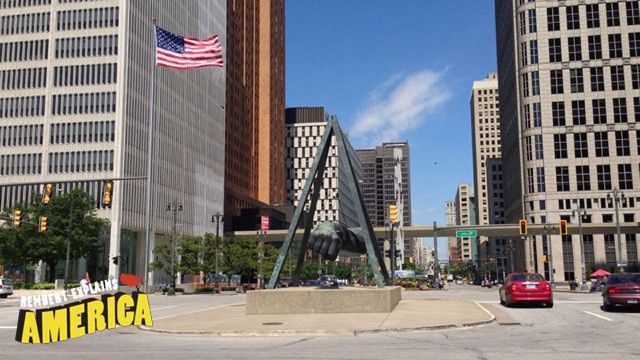
An interesting exchange takes place when you tell people you're headed to Detroit.
While it's never the same response verbatim, it usually revolves around three general themes: "Be careful," "Why?" and "Take pictures." These would be reasonable if I were, say, headed to a zoo. When discussing a city that people still call home, they're more than a little off-putting.
Detroit was one of the first places I knew I wanted to visit when this trip's route began to take shape. I've studied cities and their planning (or the lack thereof) since college and always knew this was a place I sorely needed to see. But if you were to ask me five years ago, 10 months ago, or even a week ago why my presence in Detroit was imperative, I'm not sure I'd have a good reason.
Truth be told, it was mostly voyeuristic.
The same way we're fixated by car crashes, we're mystified by struggle. And blight. And right now, there's no city mired in more struggle than Detroit.
On the whole, I don't think this country wants Detroit to make it. It sounds maniacal, but I truly believe that. We've made our peace with this still-great city firmly existing in the land of "once-great." This has been especially true since news of bankruptcy threw the city's woes on the front page of every major publication. These pieces were specific on the details of Detroit's dire economic situation, but they were operating from a distance. Highlighting the very real flaws, leaving no room for the imagination to assume positivity. They rarely acknowledged the chance of a bounce-back.
And because of this, due to the brainwash that happens when you read too much about the city, you begin to assume the worst. As you approach the city limits, you envision buildings have crumbled, cars have been overturned, the homeless outnumber the sheltered, and things are but a few steps away from martial law.
I fell victim to this line of thought only two minutes after making it downtown.
Having not even made it to my hotel, I felt as if I'd entered a Third World city.
"Be careful" and "Take pictures" were suddenly on high alert. As was the "Why?," as in "Why did I come here again?" Cities are my foremost sociological love, but this was unlike anything I'd seen before. Perhaps everything I was reading was correct. Maybe there was no hope for this place.
Finally, I pulled in to my hotel to check in, moderately rattled, and the woman at the desk gave me a heads-up.
"Don't be startled if you hear explosions," she said with a big smile on her face.
I don't know the look I gave her, because I can't see my face, but I'm certain it wasn't a big smile. Staring at her, without words, I stood still for a second. But there was no follow-up, no second sentence. She just went back to work.
Standing in the lobby, now on minute eight of Detroit, I sat down. Where was I? What was this place? And why did no one else seem taken aback by overturned subway cars and future explosions? Walking to the elevator, I overheard a conversation between two other employees during their break:
Employee 1: Did you see Mark Wahlberg the other day?
Employee 2: No, he was here?
Employee 1: Yes, I saw him. I wonder how long he'll be in town for Transformers 4. I bet it's gonna be good.
There are moments in your life when irrational fear or prejudice or judgmental nature backslap you in the face and all you can do is apologize.
I'm sorry, Detroit. I got caught up.
Now that I understood the previous 10 minutes of my stay in Detroit, thrilled that I could finally approach the city free of biases, I set out to learn. Not to explain, or philosophize, or pitch solutions, or make pretentious generalizations about its citizens and doomsaying conjecture about its future. Just to experience it.
Click HERE to read the full article!


0 comments:
Post a Comment